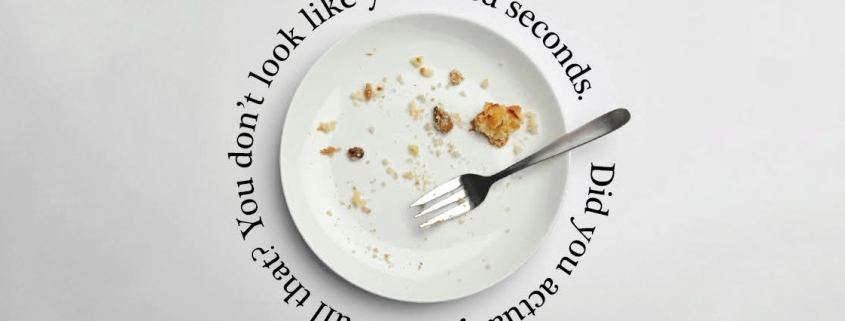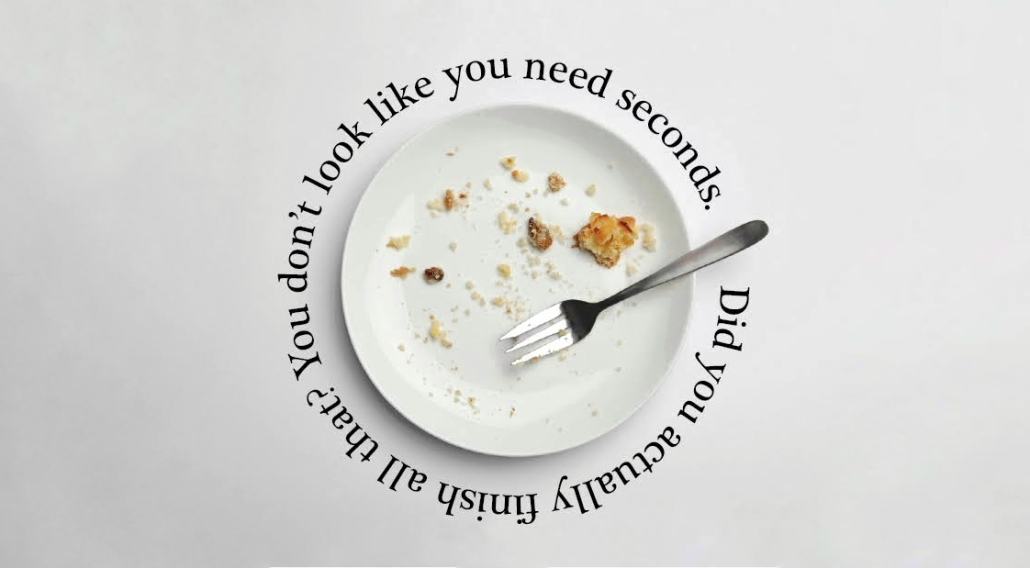USC should think twice before posting another diet-centric sign
In our Instagram-saturated world, comparison culture has become Generation Z’s bedrock, ultimately causing a disproportionate rise in body dysmorphia, eating disorders and self-consciousness. These problems surrounding body image are only compounded in college, where students’ weights generally fluctuate because of different eating habits and sporadic workout schedules.
Given the ubiquity of body image issues, USC must be more sensitive to eating disorder culture. To effectively cultivate an environment conducive to body confidence, USC must first reevaluate its signs posted around campus.
For example, the signs posted in the Parkside Dining Hall that say, “Think twice before taking another slice,” can wreak irreparable ramifications. When students repeatedly read signs instructing them to assess what they eat before eating more, they will inevitably internalize the message that they should eat less and become more likely to develop abnormal eating habits.
According to the National Eating Disorders Association, promoting diet culture can induce disordered eating patterns as “35% of ‘normal’ dieters progress to pathological dieting” and 20-25% of those diets “progress to partial or full-syndrome eating disorders.” This is why USC must replace its diet-centric signs with more body-positive messages.
For example, my friend begged me to go to the dining hall with him last week simply because he was starving and wanted two grilled cheese sandwiches. Despite the fact that I had already eaten, he believed the staff would scorn him for taking more than one, so he wanted me to grab the extra one for him.
Although they advertise USC’s waste diversion program, these signs foster a culture of feeling bad for wanting more food. This shaming can create a cycle that eventually metastasizes into an eating disorder.
Ultimately, these signs do more harm toward students than good for the environment by inadvertently perpetuating eating disorder culture. This problem is a one-step fix. To create a more favorable environment for students, especially those who are vulnerable to or struggling with an eating disorder, USC must create different signs for the dining halls.
Such signs, laden with eating disorder messages, also exist in USC Village. For example, Face Haus had a sign outside its store that read, “A spa-grade facial for the cost of two weeks of lattes,” with the sub print, “No calories. No brainer.”
While Face Haus intended to advertise its perceivably affordable and first-rate facials, it simultaneously perpetuates an unhealthy mindset by encouraging potential customers to purchase their services instead of spending money on coffee. Its sales pitch ultimately rests on the idea that skipping your regular latte allows you to cut down on calories, which, as they posit, should be a “no brainer.”
The sign ultimately romanticizes the idea of cutting calories — something essential to unhealthy diet culture. Given this store resides in USC Village, the University must implore the store to replace its sign with a different one.
USC and Face Haus can easily accomplish their goals — encouraging students to cut down on waste and attracting new customers, respectively — by having signs that simply do not promote an unhealthy eating lifestyle.
While amending signs may be a simple one-step fix, USC must also reassess any implications of including clothing stores such as Kaitlyn in USC Village. Kaitlyn offers limited clothing sizes, with its options ranging from x-small to large and pant sizes of 24 to 27. Aside from Lululemon, which offers plus-size activewear, and Target, Kaitlyn is the only store that sells women’s clothing in USC Village.
Given that Kaitlyn does not offer plus-size options, the boutique inherently ostracizes anyone who doesn’t fit into its restrictive sizes. Because this store is housed in USC Village, it insinuates that USC doesn’t prioritize body diversity as the one clothing store it offers doesn’t even include plus-size clothing. To rectify this situation, USC can offer stores or pop-up shops that offer a more diverse range of clothing sizes.
USC can also make a more concerted effort to create a body-positive atmosphere by hosting seminars where nutrition experts give information about eating disorders or posting signs around campus that promote self-love and self-confidence.
In a world where eating disorders and body concerns are particularly prevalent, USC should unequivocally help students adopt a more body-positive mindset — not fuel the problem.


